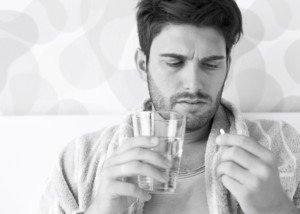
Why settle for drugs when you can lower your bad cholesterol and raise good cholesterol with natural supplements, minus side effects?
Don’t be fooled by brilliant ad campaigns for drugs — drugs that are among the best selling in the world.
Natural Supplements for Improving your Cholesterol Profile
Fiber. “Soluble fiber does have an effect on cholesterol,” says Shana Spence, MS, RDN, CDN, a registered dietitian nutritionist based in New York.
“Foods like oats, beans, Brussels sprouts, apples and carrots are all examples.”
But if you don’t care for these foods, a fiber supplement will help.
“How soluble fiber works is that while it digests, it actually attaches to the ‘bad cholesterol’ or LDL and removes them from the body,” continues Spence.
“Insoluble fiber is the kind that our body cannot digest, like in the skin of vegetables and fruits or grains. Insoluble just keeps us regular and our gut healthy.”
Green tea extract. “Green tea contains catechins, which are antioxidants,” says Spence. “EGCG is the most potent type (and the one most people have heard of) that is found and also extracted.
“There have been studies that show this particular antioxidant does help to lower LDL levels or ‘bad cholesterol.’
“To get this benefit, it’s actually recommended to take the capsule form or use the extract rather than just drinking tea, since there is only about 50-100 mg of catechins in the tea itself and 145-3,000 in supplement form, depending on which brand you purchase.
“The only thing to be mindful of is the caffeine level. For those sensitive to caffeine or for those who are pregnant it’s best to speak to a doctor.”
Niacin (vitamin B3). Spence explains, “Niacin actually works to raise the HDL levels of ‘good cholesterol’ in the body while decreasing your levels of triglycerides (a type of fat known for contributing to cardiovascular diseases).”
Niacin also lowers the bad cholesterol (LDLs).
“What niacin does best is promote digestion and also aiding the nervous system,” says Spence.
“As for treatments, niacin is most commonly used in people who have high cholesterol but can’t take statins.”
Omega-3 fatty acids. The safest and most practical source of omega-3s is the fish oil supplement.
Pantethine (vitamin B5). “Studies for this vitamin are unfortunately scarce,” says Spence. “Yes, some people have reported taking this for their cholesterol.
“Like niacin, pantethine has been found to increase HDL and decrease LDL in some.
“One particular study [Rumberger et al, Nutrition Research, 2011] found that in addition to the TLC diet, pantethine significantly decreased total cholesterol and LDL levels.
“The TLC diet focuses on foods low in cholesterol and saturated fats.
“However, the study was only 16 weeks and done on women. There is still a definite need for studies to give a definite yes on this one.”
Plant sterols (PS). Though plant sterols are found in just about all plants, the amount isn’t sufficient to impact cholesterol levels. A person, even a vegetarian, must ingest PS in concentrated form (supplements).
“Taking in around 1,000 mg of plant sterols twice per day with food has been shown to lower LDL (bad) cholesterol by as much as 15%,” says Dr. Elizabeth Klodas, a board certified cardiologist.
“Step One Foods have 1,000 mg of phytosterols per serving – so you don’t have to worry about taking the supplement.”
Policosanol. Works like statins by inhibiting the liver’s ability to make cholesterol; lowers LDL and may raise HDL.
Red yeast extract. “Red yeast rice contains a compound that is structurally similar to statin medications,” says Dr. Klodas. She adds that red yeast extract can also cause the same side effects as statins.
Tocotrienols. These antioxidants are found in barley oils and rice bran, and inhibit the liver’s ability to manufacture cholesterol.
Turmeric. Supplements are best, for potency.
Note. Supplements are available that contain many of the above compounds in just one tablet or capsule.
 Shana Spence of The Nutrition Tea is committed to providing trending information and nutrition facts covering a wide range including nutrition for heart disease and diabetes, pediatric nutrition and healthful lifestyles.
Shana Spence of The Nutrition Tea is committed to providing trending information and nutrition facts covering a wide range including nutrition for heart disease and diabetes, pediatric nutrition and healthful lifestyles.

Trained at Mayo Clinic and Johns Hopkins, Dr. Klodas believes in first changing the diet, rather than taking pills, to improve cholesterol profile.
 Lorra Garrick has been covering medical, fitness and cybersecurity topics for many years, having written thousands of articles for print magazines and websites, including as a ghostwriter. She’s also a former ACE-certified personal trainer.
Lorra Garrick has been covering medical, fitness and cybersecurity topics for many years, having written thousands of articles for print magazines and websites, including as a ghostwriter. She’s also a former ACE-certified personal trainer.
.









































